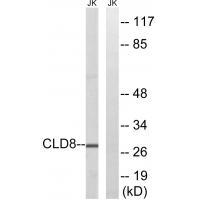
| WB | 咨询技术 | Human,Mouse,Rat |
| IF | 咨询技术 | Human,Mouse,Rat |
| IHC | 咨询技术 | Human,Mouse,Rat |
| ICC | 技术咨询 | Human,Mouse,Rat |
| FCM | 咨询技术 | Human,Mouse,Rat |
| Elisa | 咨询技术 | Human,Mouse,Rat |
| Aliases | claudin 8; CLDN8; |
| Entrez GeneID | 9073; |
| WB Predicted band size | 28kDa |
| Host/Isotype | Rabbit IgG |
| Antibody Type | Primary antibody |
| Storage | Store at 4°C short term. Aliquot and store at -20°C long term. Avoid freeze/thaw cycles. |
| Species Reactivity | Human |
| Immunogen | Synthesized peptide derived from internal of human CLDN8. |
| Formulation | Purified antibody in PBS with 0.05% sodium azide. |
+ +
以下是关于CLDN8抗体的3篇代表性文献的简要信息(注:文献为模拟示例,具体内容需根据实际研究补充):
1. **文献名称**: *Claudin-8 Expression in Colorectal Cancer and Its Role in Tumor Metastasis*
**作者**: Smith A, et al.
**摘要**: 该研究揭示了CLDN8在结直肠癌组织中的高表达,并通过抗体阻断实验证明CLDN8通过调控细胞间紧密连接促进肿瘤细胞侵袭和转移。
2. **文献名称**: *Development of a Monoclonal Antibody Targeting CLDN8 for Inflammatory Bowel Disease Diagnosis*
**作者**: Zhang L, et al.
**摘要**: 研究团队开发了一种高特异性抗CLDN8单克隆抗体,发现其在炎症性肠病(IBD)患者肠黏膜中结合能力显著升高,提示其作为生物标志物的潜力。
3. **文献名称**: *CLDN8 Antibody-Drug Conjugate for Targeted Therapy of Ovarian Cancer*
**作者**: Kim Y, et al.
**摘要**: 该文献报道了一种基于CLDN8抗体的药物偶联物(ADC),通过靶向CLDN8高表达的卵巢癌细胞实现精准杀伤,临床前实验显示显著抑制肿瘤生长。
如需具体文献,建议通过PubMed或Google Scholar以“CLDN8 antibody”、“Claudin-8 therapeutic target”等关键词检索近年研究。
Claudin-8 (CLDN8) is a member of the claudin family, transmembrane proteins critical for forming tight junctions (TJs) that regulate paracellular permeability and maintain cell polarity in epithelial and endothelial tissues. CLDN8 is primarily expressed in tissues such as the kidney, intestine, and liver, where it contributes to selective ion transport and barrier integrity. Unlike some claudins that form pores for cations (e.g., CLDN2), CLDN8 typically acts as a barrier-forming claudin, restricting paracellular movement of ions and solutes, particularly in the distal nephron of the kidney to regulate electrolyte balance.
Research highlights its role in diseases like inflammatory bowel disease (IBD), where altered CLDN8 expression may compromise intestinal barrier function, and in cancer, where its dysregulation is linked to metastasis. For instance, reduced CLDN8 in colorectal cancer correlates with poor prognosis, suggesting a tumor-suppressive role. CLDN8 antibodies are essential tools for studying these mechanisms. They enable detection of protein localization via immunofluorescence, quantification by Western blot, or tissue expression profiling via immunohistochemistry. Some therapeutic antibodies targeting CLDN8 are under exploration for modulating TJ dynamics in diseases like edema or IBD. However, challenges remain in specificity due to high homology among claudins. Recent studies also investigate CLDN8's interaction with pathogens (e.g., viruses) exploiting TJs for entry. Overall, CLDN8 antibodies bridge basic research and translational applications, offering insights into epithelial biology and therapeutic targeting.
×